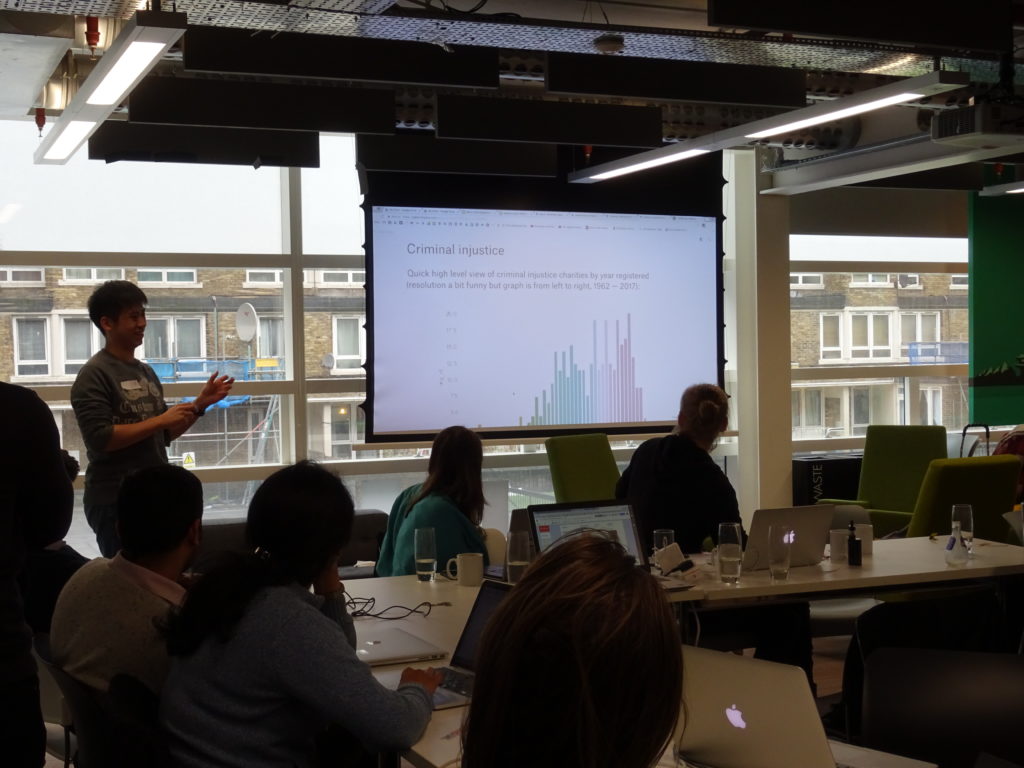What did we do in our first Data Dive?
Last month we had an exciting collaboration with DataKind UK, who ran a Data Dive for us. DataKind brings together data scientists with charities to collaborate on data analytics as part of increasing social impact. Their “Data Dives” are weekend events where volunteers come together to work on a pre-selected topic.
For our Data Dive, we decided to see what 360Giving data can tell us about funding for criminal justice programmes. We selected this topic for two reasons:
- We have estimates of the investments being made to third sector organisations working on criminal justice, but not the full picture. The majority of the data available is based on Charity Commission submissions which are several years out of date (the most recent data covers 2014/15) and its not detailed enough to analyse gaps and overlaps in the sector.
- The Ministry of Justice (MoJ) published its grants data in the 360Giving Standard for the first time in December 2017, so this was a great opportunity to compare MoJ’s grants alongside other criminal justice funders and see what the data can tell us.
What did we try to do in a day?
Profiling: Thanks to Clinks, a membership body that supports organisations that work with offenders and their families, we got a list of 304 organisations that are working in the criminal justice sector. We used Charity Commission data (thanks to Charity Base and NCVO) and UK government contracting data to see what topics criminal justice organisations are working on and who funds them.
Since most DataKind volunteers are not from the charity sector, it was refreshing to see how they approached the analysis and the different ways they visualised the data. The example below shows Charity Commission data about the income and expenditure of the Prince’s Trust and compares it to 360Giving grants data.The blue line represents the amount of grants awarded each year to the Prince’s Trust based on the 360Giving dataset, while the green line shows the total income of the charity by years.

Visualising the data in this way helps with identifying any gaps and is useful for honing in on specific questions: Is there any alternative income we need to look at? What other grantmakers have funded this charity? Do we need to look at different income streams for charities and where can we find this data?
We also found some interesting figures in the government contracts data.This was the first time we worked with data released in the Open Contracting standard. Open Contracting aims to open up the whole process of government contracting, with the aim of saving governments money and time, delivering better goods and services and reducing corruption.
We found that while charities were awarded 25% of the social service contracts issued by MoJ between 2015-2017, they received only 1.1% of the total amount spent on these services. Community Rehabilitation Companies, a special type of consortium model that was started by MoJ, received most of the funding. We’ll talk more about these findings and how we worked with contracts data in our next blog post.
Classifications: We wanted to try and use machine-learning to see if we can find more organisations that are working in the criminal justice sector. Looking for keywords in grant descriptions for example, words that describe the project focus area or its target group – can help identify if the funding is related to criminal justice activities.
By using machine-learning we wanted to try and speed up the amount of analysis we can do and to do it more consistently across the dataset. DataKind volunteers helped us think through how best to approach this, including by using Google adwords data, which is based on Google search data. This data can enrich our keywords dataset and expand the net of the search.
One day is not enough time to build a fully functioning algorithm to help with keyword classification, but we have some good foundations to work with and want to test if this approach can help us to better analyse 360Giving data in the future.
It was great to have over 40 volunteer data scientists give up their Saturday to come and work on 360Giving data. There was a lot of interest in the dataset and how it could be layered with other data to help build a bigger picture of needs and change over time.
If you are a grantmaker that wants to dig deeper into your data to see how it can help your decision making, let us know. Maybe a Data Dive is a good place to start! See all of the Data Dive outputs here.

